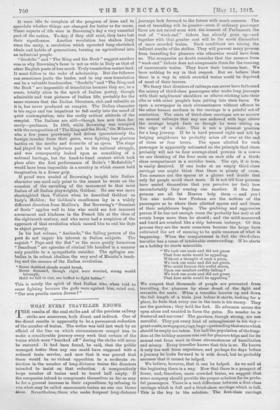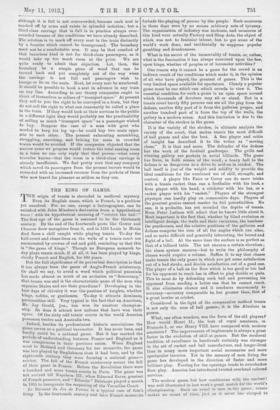WHAT EVERY TRAVELLER KNOWS.
THE results of the coal strike and of the previous railway strike are numerous, both direct and indirect. One of the direct results is apparently to be a permanent reduction of the number of trains. The writer was told last week by an official of the line on which circumstances compel him to make a considerable journey every week that certain of the trains which were "knocked off" during the strike will never be restored. It had been found, he said, that the public managed better than any one could have supposed with a reduced train service, and now that it was proved that there would be no violent • opposition to a moderate re- duction in the number of long-distance trains the directors intended to insist on that reduction. A comparatively large number of trains used to travel half empty. If the companies intend to compensate themselves as far as may be for a general increase in their expenditure by refusing to run what may be called uneconomic trains, no one can blame .them. Nevertheless, those who make frequent long-distance
journeys look forward, to the future with much concern. The.
cost of travelling will be greater—even if ordinary passenger fares are not raised soon with the consent of Parliament, the cost of " week-end " tickets has already gene up—and together with that greater cost will be the acute discomfort of more crowded trains. Such conditions are among the indirect results of the strikes. They will prevent many persons from travelling for pleasure who otherwise would have done so. The companies no doubt consider that the revenue from " week-end" tickets does not compensate them for the running of uneconomic trains. They know their business best. We have nothing to say in that respect. But we believe that
there is a way in which crowded trains could be deprived
of most of their terrors.
We fancy that directors of railways can never have fathomed the misery of third-class passengers who make long journeys with their neighbours' shoulders or elbows sticking into their ribs or with other people's bats jutting into their faces. To open a newspaper in such circumstances without offence to the other human sardines in the 'carriage is a painful act of
contortion. The seats of third-class carriages are so narrow on several railways that any one endowed with legs above the average length feels as though he were sitting on the edge of a chair. This is not a pleasant position for a long journey. If he is hard pressed right and left by bulging neighbours he probably aches all over at the end of three or four hours. The space allotted for each passenger is apparently estimated on the principle that there probably will not be four average-sized persons in a row--• we are thinking of the four seats on each side of a thirds class compartment in a corridor train. The eye, it is true, is easily deceived. If one looks at an empty third-class carriage one might think that there is plenty of room. You measure out the spaces at a glance and decide that only fat people could want more. It is not till four persons have seated themselves that you perceive (or feel) how
uncomfortably they overlap one another. If the four persons are all fat Heaven help them — and you 1 You also notice how Protean are the notions of the passengers as to where their allotted spaces end and those of their neighbours begin. The grabbing and aggressive person if he has not enough room (he probably has not) at all events keeps more than he should; and the mild-mannered and timid are crushed like a ship between icebergs. Of this process they are the more conscious because the bergs have cultivated the art of seeming to be quite unaware of what is happening. When the cOmpartnient is full the third-class traveller has a sense of intolerable overcrowding. If be starts on a holiday ho starts miserable.
" We took our seats and did not guess That four aside would be appalling. Without a thought of such a press, We took our seats and did not guess. Who could fore3se this awful stress, Upon our comfort swiftly falling P We took our seats and did not guess That four aside would be appalling."
We suspect that thousands of people are prevented from travelling for pleasure by sheer dread of the fight and scramble for seats. When a traveller hurries up and down the full length of a train just before it starts, looking for a
place, he feels that every one in the train is his enemy. They are the garrison ; they hold the fort. He advances across the open alone and unaided to force the gates. No wonder he is flustered and nervous ! The garrison, though strong, are not merciful. They put every kind of entanglement in his way- great-coats, news papers,rugs, bags—pretending that seats which should be empty are taken. Yet half the population of the king- dom at the holiday seasons sets out for pleasure trips and for its annual rest from work in these circumstances of humiliation and misery. Every traveller knows that this is so. He knows it only too well from experience, and perhaps for days before a journey ho looks forward to it with dread, but he probably assumes that it cannot be helped.
We believe, however, that it can be helped. As we said at the beginning there is a way. Now that there is a prospect of fewer, and, therefore, more crowded trains, we suggest that some company should provide the proper solution for its grate-
ful passengers. There is a vast difference between a first-class carriage which is full and a third-class carriage which is full. This is the key . to the solution. The first-class carriage although: it is full !is not overcrowded; because each Heat is forbade the.playing of :paume by.the, peeple.. Such measures Marked of by arms and exists in splendid isolation; but a in those days were by no means arbitrary acts of tyranny. third-class carriage that is full is in practice always over- The organization of industry was inchoate, and measures of crowded because of the conditions we have already described. this kind were actually•Factory and Shop Acts, the object of !Cite solution is, to mark off every seat in the train distinctly which was not to feminize labour, but to get some of the by a frontier which cannot be transgressed. The boundary world's work done; and incidentally to suppress popular need not Isere comfortable arm. It may be that comfort of gambling and drunkenness.
that luxurious kind is not for third-class passengers, as it What is the secret of the immortality of tennis, or, rather, would take up too much room at the price. We are what is the fascination it has always exercised upon the few, quite ready to admit that objection. Let, then, the upon kings, whether of peoples or of locomotor activities P •
boundary be a, simple piece of wood that can be One reason why it cannot be a game for the crowd is an turned back and put completely out of the way when indirect result of the conditions which make it, in the opinion the carriage is not full and passengers wish to of all who have played, the greatest of games. This is the lounge or lie on the seats. Next, let every seat be numbered. very limited space available for spectators. Clearly a popular It should be possible to book a seat in advance in any train game must be one which can admit crowds to view it. The on any line. According to our theory companies ought to essential condition for such a game is an open space around think of themselves as sellers of " transport space." At present which thousands of devotees may sit or stand. But in a they sell to you the right to be conveyed in a train, but they tennis court barely fifty persons can see all the play from the do not sell the right to what can reasonably be called a place dedans, another fifty part of it from the galleries proper, 'and in the train. If they would look at their services to the public another hundred part of it from the top of the walls, the in a different light they would probably see the practicability gallery in a modern sense. And this limitation is duo to the of selling as much " transport space "•as a passenger wished character of the strokes in the game.
to buy. Suppose the case of a man with gout who needed to keep his leg up—be could buy two seats oppo- It is the variety of the strokes, in ultimate analysis the variety of the court, that makes tennis the most difficult eke to each other. The present exhausting scrainbling, of ball games and also the best. A fine player and critic struggling, searching, and bribing for seats in crowded trains would be avoided. If the companies objected that the of insight has described it to the writer as "moving











































 Previous page
Previous page